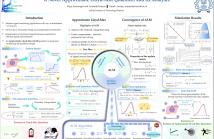
- Read more about Linear Computation Coding: Exponential Search and Reduced-State Algorithms
- Log in to post comments
Linear computation coding is concerned with the compression of multidimensional linear functions, i.e. with reducing the computational effort of multiplying an arbitrary vector to an arbitrary, but known, constant matrix.
This paper advances over the state-of-the art, that is based on a discrete matching pursuit (DMP) algorithm, by a step-wise optimal search.
Offering significant performance gains over DMP, it is however computationally infeasible for large matrices and high accuracy.
dcc23_lcc.pdf
- Categories:
 27 Views
27 Views
- Read more about Storage Constrained Linear Computation Coding
- Log in to post comments
Linear computation coding (LCC) has been developed in as a new framework
for the computation of linear functions. LCC significantly reduces the complexity
of matrix-vector multiplication. In basic LCC, storage is not restricted i.e. the
wiring exponents are arbitrary integer exponents of 2.
In this work, we constrain the set of wiring exponents to be finite. From an
information-theoretic viewpoint, this problem is function compression with a finite-alphabet
representation by atoms. We show that by an efficient choice of this set,
- Categories:
 28 Views
28 Views
Several distributed real-time signal sensing/monitoring systems require quantization for efficient signal representation. These distributed sensors often have computational and energy limitations. Motivated by this concern, we propose a novel quantization scheme called Approximate Lloyd-Max (ALM) that is nearly-optimal. Assuming a continuous and finite support probability distribution of the source, we show that our ALM quantizer converges to the classical Lloyd-Max quantizer with increasing bitrate.
- Categories:
 150 Views
150 Views